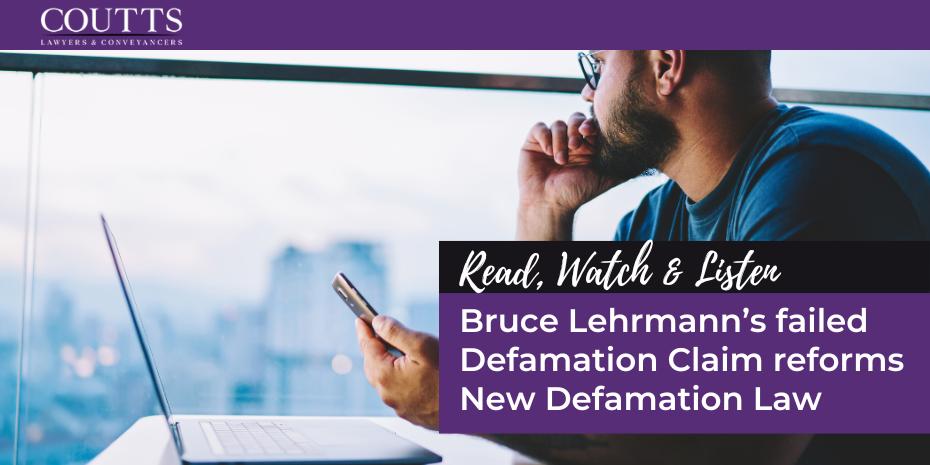The Federal Government has finalised a mandatory code of conduct in relation to commercial and retail leases
KEY TAKE OUTS:
- The Code of Conduct will be required to be enacted by each state and territory
- The Code recommends a proportionality principle i.e. any reduction in rent should proportionally reflect the reduction in turnover.
- Landlords who have been approached by a tenant to obtain rent relief, should ask tenants to “open their books” to demonstrate the financial situation and reduction in business turnover. This may include comparative data from the previous 12 months.
Yesterday the Federal Government finalised a mandatory code of conduct in relation to commercial and retail leases.
In summary the Code of Conduct:
- Will be required to be enacted by each state and territory;
- the code of conduct will apply if the tenant is a small and medium business with a turnover of less than $50m and is eligible for the JobKeeper assistance;
- the landlord and tenant should negotiate in good faith to reach a mutually agreed outcome;
- the Code recommends a proportionality principle i.e. any reduction in rent should proportionally reflect the reduction in turnover, we explain this further below;
- if a tenant has not experienced a reduction in business turnover and obviously wouldn’t fit the JobKeeper assistance there is no entitlement to rent relief and rent should continue to be paid where possible;
- the code will provide for:
- a stop on termination of leases for non-payment of rent;
- a freeze on rent increases;
- a stop on penalties for tenants who stop trading or reduce opening hours;
- a stop on landlords passing land tax to tenants;
- a stop on landlords charging interest on unpaid rent;
- landlords to not be able to make a claim on a bank guarantee or a security deposit for non-payment of rent;
- removal of any legislative barriers or administrative hurdles to lease extensions are removed, this means that a tenant and landlord could agree a rent waiver in return for a lease extension;
- for landlords and tenants that sign up to the code of conduct, State and Territories have agreed to look at providing the equivalent of at least a 3 month land tax waiver and 3 month land tax deferral on application for eligible landowners, with jurisdictions to continue to monitor the situation, however landlords must pass on the benefits of such relief to tenants;
- mediation in the event that landlords and their retail and commercial tenants were unable to reach agreement will be provided as needed through existing State and Territory mechanisms.
Proportionate Reductions Explained:
Under the Code, landlords must offer tenants proportionate reductions in rent payable in the form of a waiver and deferral of up to 100% of the amount ordinarily payable on a case by case basis.
Rent Waivers must constitute no les than 50% of the total reduction in rent payable and the balance being amortised over the balance of the lease or 24 months, whatever is greater (unless otherwise agreed by the parties).
Any benefits received by the landlord, ie reduced land tax, reduced insurance etc must be passed onto the tenant.
Examples of practical variations reflecting the application of the principle of proportionality may include, but are not limited to:
- Qualifying tenants would be provided with cash flow relief in proportion to the loss of turnover they have experienced from the COVID-19 crisis ie. a 60% loss in turnover would result in a guaranteed 60% cash flow relief.
- At a minimum, half is provided as rent free/rent waiver for the proportion of which the qualifying tenant’s revenue has fallen. o Up to half could be through a deferral of rent, with this to be recouped over at least 24 months in a manner that is negotiated by the parties.
- So if the tenant’s revenue has fallen by 100%, then at least 50% of total cash flow relief is rent free/rent waiver and the remainder is a rent deferral. If the qualifying tenant’s revenue has fallen by 30%, then at least 15% of total cash flow relief is rent free/rent waiver and the remainder is rent deferral.
- However if the lease only has another 6 months left under their term, then the tenant would still have a minimum of 12 months after the pandemic period to cover the deferral of rental payments.
The parties would be free to make an alternative commercial arrangement to this formula if that is their wish.
For tenancies which do not fall within the mandatory code of conduct, landlords and tenants will be free to make their own commercial arrangements in relation to an appropriate level of rent abatement (if any) and the consequences which will flow from that.
If you are a landlord, where to from here?
As a landlord who has been approached by a tenant to obtain rent relief, you should ask the tenant to show their financial and “open their books” to demonstrate a reduction in business turnover.
You should also ask for comparative data from the previous 12 months. Such information might include:
- evidence that the business is eligible for the “JobKeeper” assistance and has a turnover of less than $50 million (in which case the mandatory code will apply);
- a statement of financial position, outlining income, expenses, assets and liabilities (preferably audited or certified by a chartered accountant), currently and pre-1 March 2020;
- year to date and recent financial year financial statements for the impacted location, and guarantor entity:
- P&L or Income Statement;
- Balance Sheet;
- Or any other relevant information depending on the nature of the business,
- what arrangements are currently in place for the ongoing operation of the business, such as work from home arrangements and whether staff have been stood down; and
- whether the tenant holds business interruption insurance that covers the payment of rent and outgoings and if the circumstances for a claim on that insurance have been triggered.
It is an obligation of the tenants seeking rent relief will need to be able to justify the relief sought with reference to this information so that the relief is proportionate and reasonable.
Issues with the Code
Whilst we needed some solution to the current pandemic and situation, the Code does feel that it doesn’t take into account self funded retirees who rely on the income of their rentals to survive. Further all of the Government’s stimulus packages do not assist self funded retirees in relation to any shortfall of income they will experience. So whilst the Code is a great move in the right direction, there is a part of the market that hasn’t been considered by the Government.
For more information, click here to view the Code Of Conduct For Leasing fact sheet.
ABOUT ADRIANA CARE:

Adriana is the Managing Partner for Coutts Lawyers & Conveyancers. She acts for large commercial financial institutions in relation to corporate governance, and the provision of retail and wholesale credit and funding facilities for both the commercial and consumer market.
She also acts for a range of ADIs, finance companies, vendor introduces and equipment lessors. She acts for a number of franchisor and franchisees, as well as small property developers, builders and commercial property leases and debt recovery. Adriana has also worked in the fields of insolvency, commercial disputes and litigation and occupational.
For further information please don’t hesitate to contact:
Adriana Care
Managing Partner
adriana@couttslegal.com.au
1300 268 887
This blog is merely general and non specific information on the subject matter and is not and should not be considered or relied on as legal advice. Coutts is not responsible for any cost, expense, loss or liability whatsoever in relation to this blog, including all or any reliance on this blog or use or application of this blog by you.



